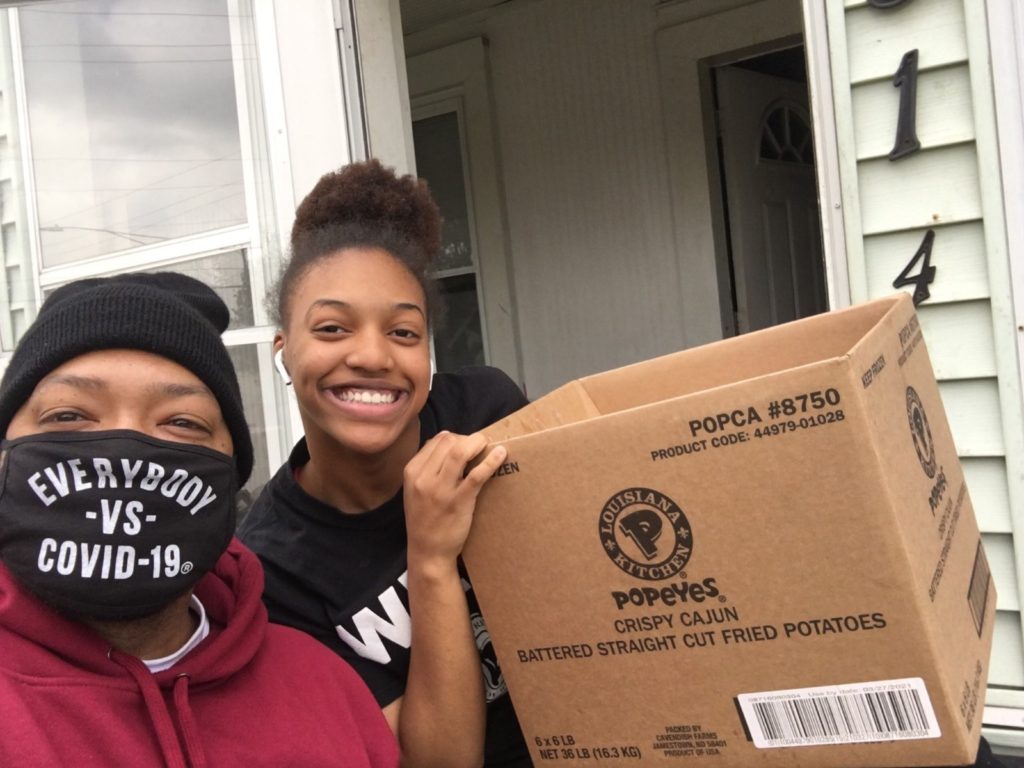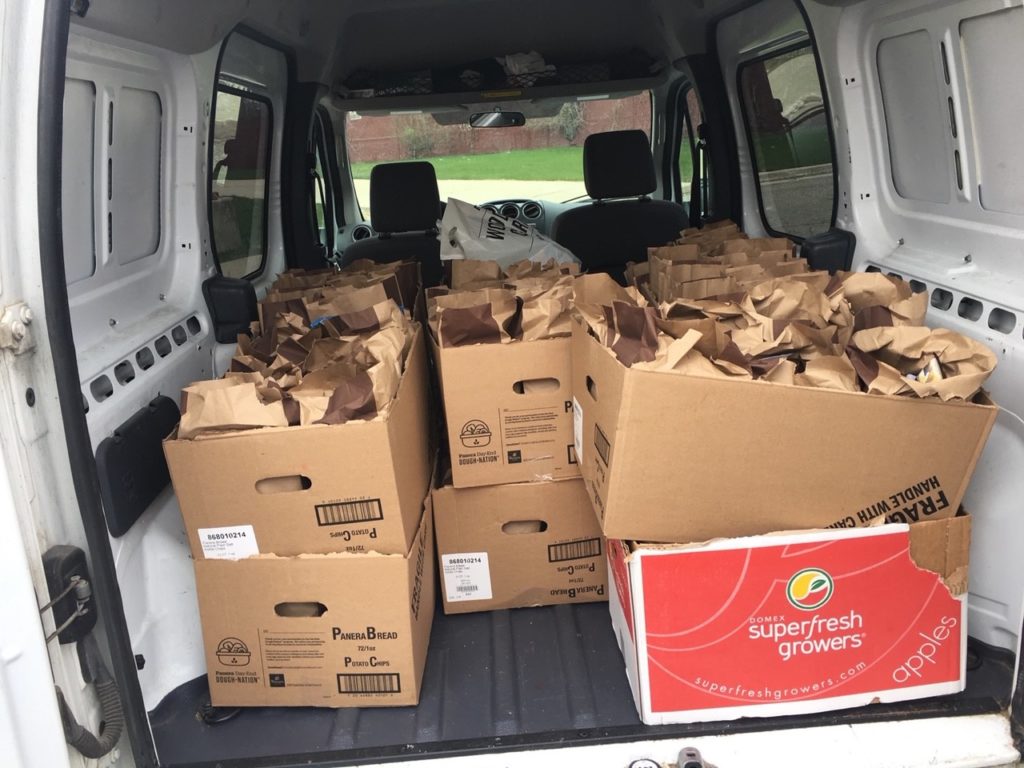Community Response Fund helps students go digital
Published on September 10, 2020
For Keliah and many others, school is more than a place of learning. It’s a place of connection, support and peace.

When Keliah Taylor pictured her senior year of high school, she imagined elaborate prom dresses and shaking hands as she made the long-awaited walk across the graduation stage. She also envisioned something else that – for her – was even more important: a chance at redemption.
After spending much of her first two years at Westside Academy in Detroit doing what she describes as “slacking off” and “having a bad attitude,” the now 18-year-old turned things around during her 11th- and 12th-grade years, landing an internship at United Way for Southeastern Michigan and becoming vice president of her school’s senior committee.
She was looking forward to helping other students complete a similar transformation. Then came COVID-19.
Schools and programs across Michigan shut their doors and went virtual. Within a matter of weeks, our COVID-19 Community Response Fund stepped in to offer millions of dollars in grants to organizations, including public and charter school districts, to provide technology, life skills development and mental health services for students.
“We know that 44 percent of households in the region are ALICE households, meaning they were unable to meet their basic needs even before COVID-19,” said Vanita Sanders, interim director of Education Initiatives at United Way for Southeastern Michigan. “School was a place where many of these children and their families received a lot of support services. We needed to fill that gap.”
School as a safe haven
For Keliah and many others, school is more than a place of learning. It’s a place of connection, support and peace.
She said much of the difficulty she faced early in high school could be traced to a difficult home life. When she was able to build relationships with caring adults in school and in her community, it made all the difference.
“It’s so unexplainable when you have no one to talk to at home for your whole life, and then once you make that connection, everything changes,” Keliah said.
According to Tarence Wheeler, director of corporate and community affairs for River Rouge School District, that’s the case for many children.
“That’s part of why this virus is so devastating – kids need those hugs and handshakes and high-fives,” he said. “It helps them to have that family atmosphere at school that they may not have at home, and that’s what gives them the little extra push they may need to succeed.”
Now that students are at home and expected to participate in online classes, many find it more difficult to concentrate.
“There’s a lot on these kids at home all day. There’s noise. There are distractions. Some have to be the babysitters for younger siblings or make store runs for the family. People are talking about PTSD (post-traumatic stress disorder) caused by coronavirus, but there’s a lot of current stress our students are dealing with too.”

No substitute for in-person learning
With grant funding from United Way, River Rouge School District staff conducted wellness visits to connect with students at home to help them stay on track.
“When we knock on the door, these kids’ faces just light up. Right there, they know that somebody cares,” Tarence said.
In addition, the school district used the grant funds to provide 100 Chromebooks, headphones and internet access to support virtual learning.
The Yunion also received support from the COVID-19 Community Response Fund, allowing the organization to shift from in-person programming to a virtual platform. The Yunion provides a variety of programs to support young people’s socio-emotional growth and mental well-being, including conflict resolution training, life skills and risk aversion, as well as training in job skills and science, technology, engineering and math.
“We’re using United Way support to not only adapt our curriculum to a virtual format, but also to provide tablets to students with technological needs. We’ve hired a project manager to ensure this conversion runs smoothly,” said Nicole Wilson, The Yunion’s executive director.
Removing barriers to success
COVID-19 Community Response Funds are also helping Communities in Schools of Michigan (CIS) remove potential barriers to success.
The organization works directly with 46 schools across the state, including 22 schools in eastern Michigan, to build relationships that empower students to stay in school and succeed in life. Its school-based staff works with teachers to identify challenges students are facing and coordinates with community partners to bring outside resources into the school. Or as Isha Bhatt, regional director for the organization’s eastern region likes to say, “We do whatever it takes for a student to thrive.”
With COVID-19, they needed to take their services virtual, and United Way was there to help them do it.
“We really are so thankful to United Way,” Isha said. “With their support and support from other organizations, we’re able to keep our 30 site coordinators on and in contact with students to help during this time when they need it most.”
For students in the CIS network, that could mean they receive virtual meditations to relieve stress or help with homework. Their families might get help to avoid eviction or find food resources. United Way funding also helped CIS distribute food and other basic needs to over 1,500 families in the region.
“Students can only feel empowered when families feel empowered,” Isha added.
The connection between basic needs and education cannot be overstated, Vanita said, adding that stable households form the foundation where students can work toward achieving their educational goals.
“We know a computer doesn’t fix everything,” she said. “If basic needs like food and shelter aren’t being met, you can’t even think about opening a laptop or picking up a book and getting an education.”
Closing the gap
In Pontiac, for example, 40 percent of families are unable to meet their basic needs despite full-time employment, according to the most recent ALICE report, and only 12 percent of third graders in the Pontiac School District are proficient in reading.
As part of our approach to COVID-19 recovery, we’re committed to reducing the disparities in the grade-level literacy proficiency of children and in the foundational skills gaps of adults.
With that in mind, we’ve launched the Pontiac Literacy Initiative, which aims to build foundational literacy through $250,000 in grant funding to the city’s schools and organizations.
“We’re challenging organizations to come up with creative solutions to close the skills gap in Pontiac,” Vanita said. “It is imperative that the organizations who provide direct services to Pontiac residents have the resources to not only respond to the immediate COVID-19 crisis but are also prepared to respond to long-term recovery and resiliency needs within the community.”
Planning for every scenario
Pandemic-driven revenue shortfalls loom large over education funding in the region and across Michigan. Although in-person learning is in limbo due to COVID-19, education and connection don’t have to be.
“At this point, we’re writing contingency plans for the contingency plans,” Tarence said. “We’ll all have to get creative as long as this virus is around.”
The more organizations can find creative solutions that prioritize student safety, the better student outcomes will be.
River Rouge, for example, recently held a drive-thru graduation ceremony and implemented Feel Good Fridays where staff members show up to a student’s home with chicken, pizza or other food just to put a smile on their face and maintain the bonds they built throughout the school year.
Looking to the upcoming school year, United Way is working closely with schools and organizations to minimize disruptions to students’ education and to continue to close the skills gap.
“COVID-19 is an unprecedented situation,” Vanita said. “Few things – including our students’ education – will be unaffected and that’s why it’s so important for organizations to continue to come together and to learn from one another in real time.”
To donate to the COVID-19 Community Response Fund, click here.